Polyphenylene Sulfide (PPS)
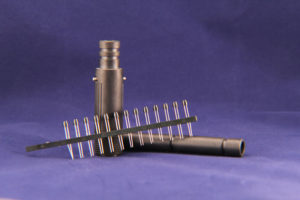 Correct processing of Polyphenylene Sulfide (aka PPS, Ryton®, or FORTRON®) is critical in order to achieve the stated properties of this material. At Rebling, we employ state of the art equipment in order to mold Polyphenylene Sulfide components in a fully crystalline state. Mold temperatures of at least 275°F are required to achieve crystallinity. Rebling typically molds in excess of 300°F using either "hot oil "units or cartridge heaters for mold heating.
Correct processing of Polyphenylene Sulfide (aka PPS, Ryton®, or FORTRON®) is critical in order to achieve the stated properties of this material. At Rebling, we employ state of the art equipment in order to mold Polyphenylene Sulfide components in a fully crystalline state. Mold temperatures of at least 275°F are required to achieve crystallinity. Rebling typically molds in excess of 300°F using either "hot oil "units or cartridge heaters for mold heating.
When polyphenylene sulfide is molded below 275°F, the moldings are amorphous or semi crystalline and remain in this state until they are exposed to higher service temperatures. If the service temperature exceeds the molding temperature, the parts will become more crystalline resulting in dimensional and property changes. For example, the Heat Deflection Temperature (HDT) of PPS molded in a noncrystalline state is only 350°F but increases to 500°F in the crystalline state.
Polyphenylene sulfide is a high flow material and is an excellent choice for thin walled plastic injection moldings. Insert molding is routinely performed at Rebling using PPS as the molding compound.
There are several grades of this material available for the injection molding process. All of these material grades contain fairly high concentrations of glass and/or minerals, in some cases up to 70% by weight. The extremely excellent chemical resistance of PPS, coupled with its high heat deflection temperature, makes it an ideal candidate for replacing metal parts as well as an alternative to thermosets. PPS is also suitable for cryogenic applications as it retains its mechanical properties at low temperatures.
Rebling molds PPS for a variety of end uses including electrical connectors, instrumentation housings, telecommunication devices, and military applications.
Properties of Polyphenylene Sulfide plastic
PPS is inherently flame retardant and can achieve UL 94 V0 ratings in wall thicknesses as low as 0.015 inches without the use of flame retardant additives. The shrinkage of PPS varies depending on the part wall thickness and the flow direction of the material during the molding process with shrinkage in the transverse flow direction two times greater than that in the flow direction, typical of crystalline materials. Extremely tight tolerances therefore may be more difficult to achieve when selecting a crystalline material like PPS over an amorphous material that has uniform shrinkage in all directions.
The two important properties to consider when selecting PPS are it's excellent across the board chemical resistance and high heat deflection temperature. The UL temperature index of this material (often referred to as the continuous use temperature) can exceed 200°F. This is surpassed only by thermoset plastics and a few thermoplastic materials costing 10 to 20 times more in price.
PPS is available in brown, black and blue opaque colors and there are a limited number of color concentrates available for PPS.
When designing PPS parts for plastic injection molding, undercuts should be avoided since the material has very little elongation.
Secondary Operations for Polyphenylene Sulfide plastic parts
Rebling ultrasonically welds PPS materials and utilizes the ultrasonic process for installing metal inserts into PPS moldings.
The material can be machined but is very abrasive to cutting tools due to the high filler concentrations.


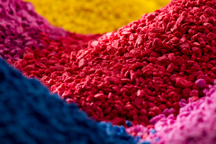 Thermoplastic
Thermoplastic ABS
ABS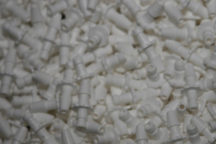 Acetal
Acetal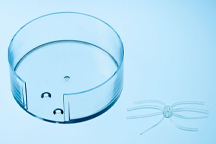 Acrylic
Acrylic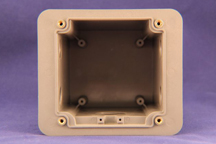 EMI
EMI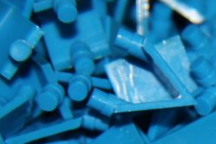 Noryl (PPO)
Noryl (PPO)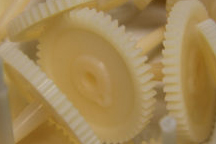 Nylon (Polyamide)
Nylon (Polyamide)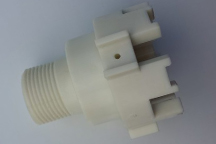 Polybutylene Terephtalate (PBT)
Polybutylene Terephtalate (PBT)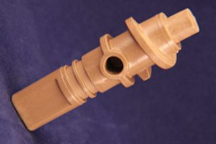 Polyether Ether Ketone (PEEK)
Polyether Ether Ketone (PEEK)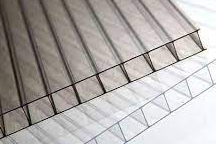 Polycarbonate (PC)
Polycarbonate (PC)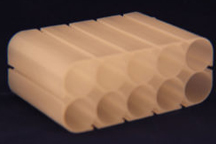 Polyethylene (PE)
Polyethylene (PE)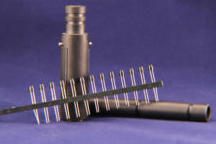 Polyphenylene
Polyphenylene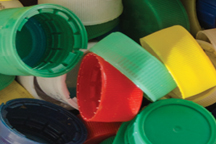 Polypropylene (PP)
Polypropylene (PP)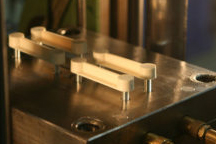 Polystyrene (PS)
Polystyrene (PS)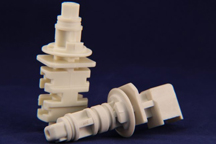 Polysulfone (PSU)
Polysulfone (PSU)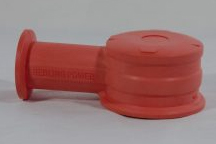 Thermoplastic Elastomers
Thermoplastic Elastomers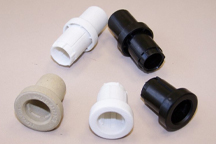 UHMW
UHMW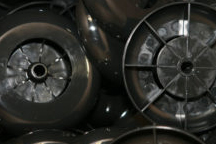 Polyetherimide (Ultem)
Polyetherimide (Ultem)